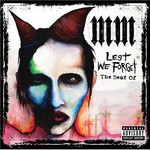Lest We Forget: The Best Of
Compilation by Marilyn Manson released in 2004Lest We Forget: The Best Of review
It is hard to believe that a few years ago Middle America had no better nightmare than Marilyn Manson's arena-rock evil. Lest We Forget The Best Of is a fitting tombstone to Manson's moment in the mainstream: it includes all of his essential pied-piper calls to alienated suburban youth. Manson's mix of fetish, goth, hedonism and metal still jells on these tracks and others. There couldn't be a more fitting title for this collection of gruesome grooves by modern rock's most paradoxical artist. How could anyone forget the self-proclaimed "Antichrist Superstar" and his macabre circus? Once a Trent Reznor (Nine Inch Nails) protege, the visually intense Marilyn Manson quickly eclipsed his mentor with releases that peered beneath the facade of American life, revealing a seedy, grotesque, and often disturbing reality. Considering that Marilyn Manson never pandered to the Top 40 set, Lest We Forget can't rightfully be dubbed a greatest-hits record; it serves more as a reminder of the man and his group's 10-year blitz of ghoulish, gory, industrial rock.
Not every single had a great hook – Tourniquet is a moody dirge, indicative of what awaits a listener on the album tracks – but the best of them did, whether it was Lunchbox from the debut, the delirious The Beautiful People, the glam-stomp of The Dope Show, or the Faith No More homage mOBSCENE. All these are here and the album has enough of the hits to make this worthwhile for the casual fans, as well as those listeners who never wanted to admit that these late-'90s alt-rock radio staples were guilty pleasures. Contained in this Best Of are three covers, including Soft Cell's Tainted Love and a new cover of Depeche Mode's Personal Jesus. The best of the bunch is still the cover of the Eurythmics' Sweet Dreams, which remains a Manson highlight due to Trent Reznor's production, a creepy Manson vocal, and at the time of its release, an equally creepy music video. Sadly, when they're collated on this album it becomes glaringly obvious that these cover versions have formed the backbone of Manson's career. Nonetheless, his take on Sweet Dreams is particularly effective. Nearly ten years old now, it sounds every inch as creepy as it did on 1995's Smells Like Children.
Like all great bands that are indicative of - and manage to represent - the current cultural and social climate, Manson signifies an antithesis to the safe saccharine pop world, an underbelly or counter culture to cherry pie, strawberry milkshake America. Almost a martyr to a discouraged generation of youth, he represents a time and a place, standing both for and against a variety of important, sometimes hypocritical, issues. Throughout his career, Manson has been the subject of much critical prose. Often disregarded or undermined because of his supposedly anti-Christian and anti-moral messages he speaks his mind on issues that may not wish to be heard by the Establishment and in doing so his music has ended up in widespread circulation. This, one can imagine, is exactly what he wanted and in doing so adds a value to him both musically and individually. Lest We Forget The Best Of is an overview and a culmination of ten controversial years. Musically and socially speaking his presence is required for another ten.

